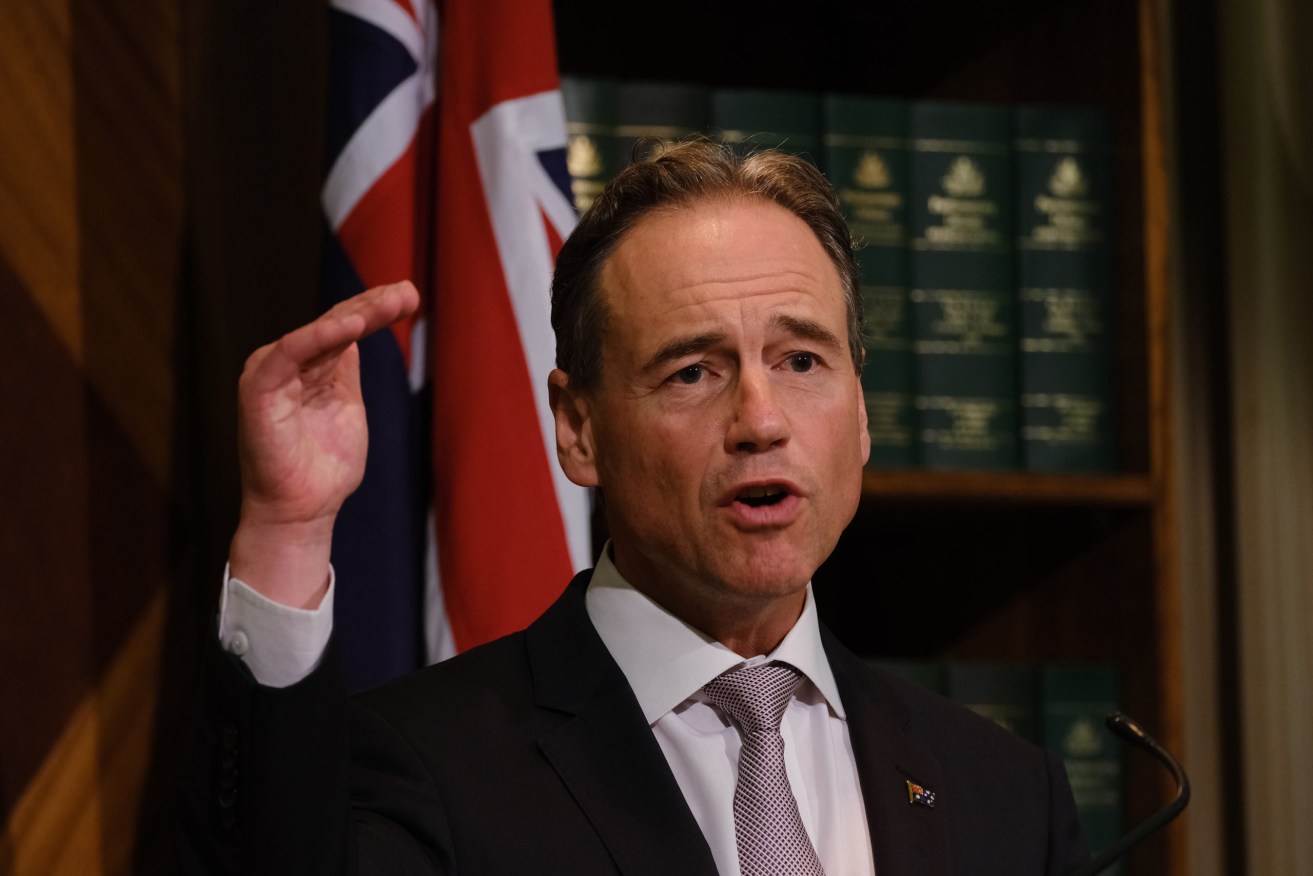Government asks for calm as it scrambles to deal with rogue virus strain
The emergence of a concerning new Covid-19 variant has put Australia on alert and prompted a meeting of the powerful national security committee.

Federal Health Minister Greg Hunt says there are signs that Omicron infections have hit a plateau. (AAP Image/Luis Ascui)
The country’s Chief Medical Officer, Paul Kelly, said Monday that it was not yet clear what the future looks like in terms of the Omicron variant.
And Federal Health Minister Greg Hunt has asked Atagi, the Government’s immunisation advisory group, to review the current time frames for Covid-19 booster shots in order for the country to have a head start should Omicron emerge as more severe than previous strains of the virus.
The national security committee is set to meet Monday afternoon and a meeting of National Cabinet is expected Tuesday and comes as Prime Minister Scott Morrison urged calm.
Leaders now need to revisit plans for international borders and whether the country can reopen to double-dosed visa holders, skilled workers and international students from Wednesday as originally planned.
The new variant, which has put the world on alert and rocked share markets, first emerged in Southern Africa, where evidence so far is that its symptoms are relatively mild.
Dubbed a “variant of concern” by the World Health Organisation that is potentially more contagious than previous variants, has been detected in Australia, Belgium, Botswana, Britain, Denmark, Germany, Hong Kong, Israel, Italy, the Netherlands, France, Canada and South Africa.
Two young people who travelled to Sydney from South Africa have tested positive in hotel quarantine to the Omicron variant. Both were fully vaccinated and asymptomatic.
Two people who had tested positive in Hong Kong were both also fully vaccinated and asymptomatic.
Hunt said he had spoken with the chief executives of both vaccine giants, Pfizer and Moderna, and had been assured further vaccine supplies were prepared and ready.
“We are in a vastly different position from where we were on the 1st of February 2020. We are one of the most highly vaccinated, one of the most recently vaccinated and one of the first to announce a whole of nation booster program around the world,” Hunt said.
“Much of the early evidence is of a mild set of outcomes and symptoms.”
Kelly said there were many unknowns about Omicron at this early stage and South Africa, where it originated was very different to Australia.
He said South Africa has a much younger population than Australia, a different health system and laboratory network and high HIV rates.
But so far there is no evidence that the current vaccines are less effective against Omicron.
“Certainly it is called a variant of concern because we are concerned but we are seeking further advice and information.
“It is not clear at this stage what the future looks like and I can’t predict that,” Kelly said
He said it was important to be “alert not alarmed”.
Victoria, NSW and the ACT have introduced a blanket 72-hour quarantine requirement for all international travellers.
New arrivals from nine southern African countries that Australia has shut its border to must quarantine for 14 days.
Queensland recorded no local Covid-19 cases on Monday but a family of five, in hotel quarantine, have all tested positive but there is no suggestion it is the Omicron variant.
Deputy Premier Steven Miles said the family had travelled from Pakistan.
The World Health Organisation says it’s not yet clear whether Omicron is more transmissible than other variants, or if it causes more severe disease.
“Preliminary data suggests that there are increasing rates of hospitalisation in South Africa, but this may be due to increasing overall numbers of people becoming infected, rather than a result of specific infection,” WHO said on Sunday.
It said understanding the level of severity of Omicron “will take days to several weeks”.
The detection of Omicron triggered global alarm as governments around the world scrambled to impose new travel curbs and financial markets sold off, fearing the variant could resist vaccinations and upend a nascent economic reopening after a two-year global pandemic.
The WHO said it was working with technical experts to understand the potential impact of the variant on existing countermeasures against Covid-19, including vaccines.
Britain said it would convene an urgent meeting of G7 health ministers on Monday.
Dutch health authorities said 13 Omicron cases were found among people on two flights that arrived in Amsterdam from South Africa on Friday.
Authorities had tested all of the more than 600 passengers on the flights and found 61 coronavirus cases, going on to test those for Omicron.
“This could possibly be the tip of the iceberg,” Health Minister Hugo de Jonge told reporters.












